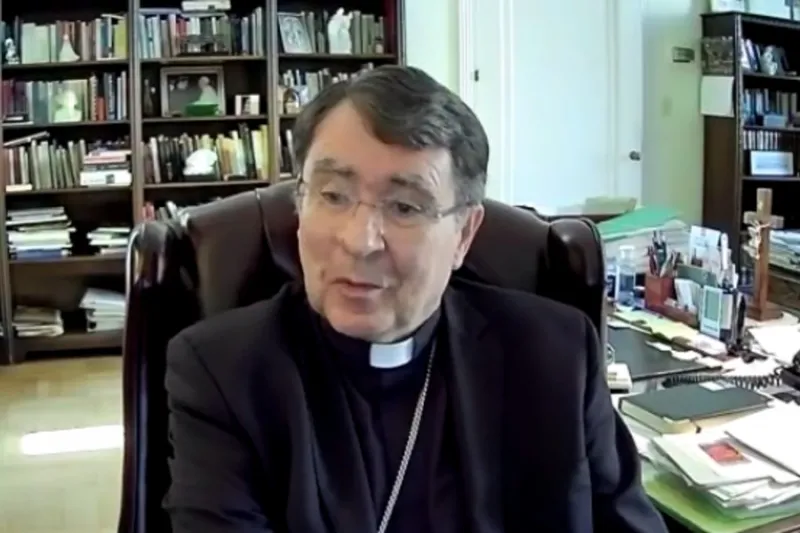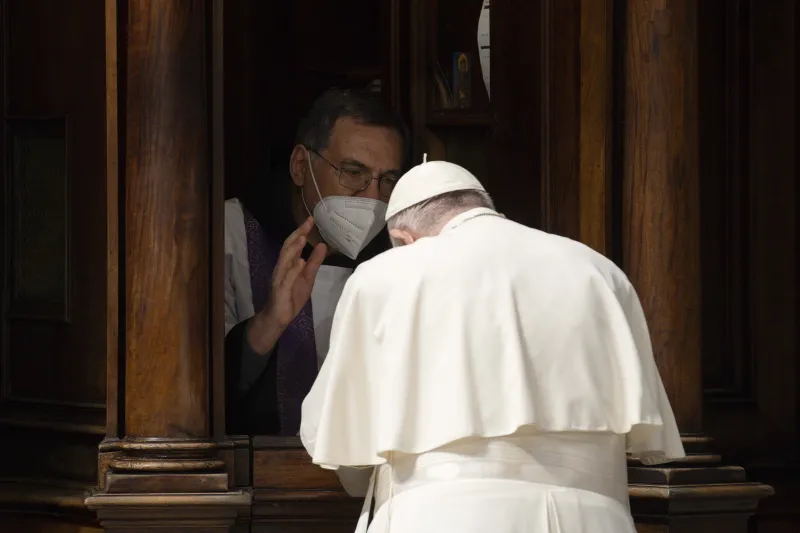 Archbishop Christophe Pierre, apostolic nuncio to the United States, addresses the July 28 online panel hosted by Georgetown University’s Initiative on Catholic Social Thought and Public Life / Initiative on Catholic Social Thought and Public Life
Archbishop Christophe Pierre, apostolic nuncio to the United States, addresses the July 28 online panel hosted by Georgetown University’s Initiative on Catholic Social Thought and Public Life / Initiative on Catholic Social Thought and Public Life
Washington D.C., Jul 28, 2021 / 17:05 pm (CNA).
The sacrament of confession must be part of the U.S. bishops’ discussions on worthiness to receive Communion, the Apostolic Nuncio to the United States said on Wednesday.
Archbishop Christophe Pierre, the Apostolic Nuncio to the United States, said at an online panel that the conversion of souls should be the bishops’ primary aim when teaching about reception of Holy Communion.
“The starting point cannot be to shame the weak, but to propose the One Who can strengthen us to overcome our weaknesses, especially through the sacraments of reconciliation and the Eucharist,” Archbishop Pierre said at an online panel discussion on Wednesday.
“By the way, there is a link between the two [sacraments],” the nuncio added.
Archbishop Pierre addressed a July 28 online panel discussion of “Communion, Catholics, and Public Life,” which focused largely on a draft Eucharistic document of the U.S. bishops’ conference.
At their recent spring meeting, held virtually this year due to the pandemic, the U.S. bishops voted decisively to begin drafting a teaching document on the Eucharist. The meeting featured extensive debate both for and against moving ahead with the document at the time.
A proposed outline of the document covered various teachings on the Eucharist, including a subsection on worthiness to receive Communion – “Eucharistic consistency.”
That subsection received most of the attention at the bishops’ meeting. Some bishops opposed to drafting the document at the time argued that in addressing worthiness to receive Communion, the bishops would be seen as partisan players, rebuking Catholic politicians who oppose the Church’s teachings on abortion laws.
Some bishops critical of the motion also said that to pronounce who should and should not receive Communion would drive Catholics away from the Eucharist at a time when unity in the Church is needed.
Archbishop Pierre was asked about the episcopal deliberations on Wednesday. He admitted the difficulty the bishops faced in “discerning” what to do on the teaching document.
“The discernment is quite difficult, because there is always the danger to be overwhelmed by the tensions. And we know these tensions are quite often ideological tensions which may divide us,” he said.
“This is why we have heard about the risk of instrumentalization of the sacraments, and indeed, of the Eucharist,” he continued, noting “how to remain firm, faithful to the message of the Gospel and avoid any kind of ideological war.”
After the Nuncio spoke on Wednesday, two U.S. bishops participated in the online dialogue on Communion – Bishop Kevin Rhoades of Fort Wayne-South Bend, chair of the doctrine committee at the U.S. bishops’ conference (USCCB), and Cardinal Joseph Tobin of Newark.
As current chair of USCCB doctrine committee, Bishop Rhoades is currently in charge of drafting the teaching document on the Eucharist.
The idea for the document surfaced shortly after the election of President Joe Biden. A USCCB working group was established in November 2020 to deal with challenges of a Catholic in the White House – Biden – who contradicted Church teaching on life and marriage issues. Biden supports taxpayer-funded abortion and the redefinition of marriage, among other policies contrary to Church teaching.
The bishops’ working group recommended a teaching document on the Eucharist, to inform Catholics – especially Catholic politicians – of the need to conform their lives to Church teaching in order to receive the Eucharist worthily and avoid giving scandal.
Bishop Rhoades on Wednesday said the Eucharistic document is meant to be “a teaching document,” one “that would focus more broadly on the Eucharist as the source and summit of our identity as Catholics.” It is addressed to all Catholics and is not a political statement, he said.
Regarding worthiness to receive Communion, the Church already has taught that discipline in canons 915 and 916 of the Code of Canon Law, he said on Wednesday. Canon 915 states that those “obstinately persevering in manifest grave sin are not to be admitted to holy communion.”
The document, Rhoades emphasized, “will not be establishing national norms or a national policy” on admittance to Communion.
Bishop Rhoades added that it is the teaching of the Church that, in order to be properly disposed to receive Communion, a Catholic must “assent to the deposit of faith that’s contained in Scripture and Tradition that the Apostles entrusted to the Church.”
Meanwhile, Cardinal Tobin on Wednesday expressed some criticism about the decision to draft the document at the current moment. “This document was born in some confusion,” he said, warning that it would be received by many Catholics as a partisan gesture.
Cardinal Tobin noted that the USCCB established a working group and drafted a document on worthiness to receive Communion after the election of Joe Biden. They did not do so right after the election of Donald Trump as president in 2016, he said, taking more than a year to set up any such working group during Trump’s presidency.
Part of the USCCB’s reason for setting up the working group in 2020 was Biden’s professed Catholic faith, and the added possibility of scandal with a Catholic in the White House contradicting Church teaching on grave moral issues.
Bishops should be consulting not only among themselves, but with the lay faithful on the Eucharistic document, Tobin said.
“I think what we need is a broader consultation with the American church on the mystery of the Eucharist,” Cardinal Tobin said, “not one that, like it or not, is perceived as a political action.”
Cardinal Tobin was also asked about recent reports on the use of the gay dating and “hookup” app Grindr by clergy and seminarians.
The Catholic news website The Pillar on July 20 published its investigation claiming that, according to records of app signal data, the cell phone of the USCCB’s associate general secretary regularly emitted Grindr data signals during parts of the years 2018-2020. The secretary in question, Monsignor Jeffrey Burrill, became USCCB general secretary after the bishops’ November 2020 meeting. He resigned his post shortly before The Pillar published its investigation.
The Pillar has since published stories saying it reviewed data of Grindr app usage at rectories in the Newark archdiocese, and at the Vatican. The Archdiocese of Newark responded last week that it would investigate the allegations.
Cardinal Tobin on Wednesday said that priests could not be using the apps after having taken vows of celibacy, but also noted the “ethics” surrounding the gathering of the phone app data.
“All of us as Catholics take promises,” he said, noting vows made related to the sacraments of Baptism, Matrimony, and Holy Orders. “We should keep our promises, and we should repent when we don’t keep our promises,” he said.
For priests who have taken vows of celibacy, having a dating app on their phone “is asking for trouble,” Tobin said.
He also noted the “very questionable ethics around the” gathering of phone app data, and added that the information The Pillar shared with the Newark archdiocese “is very general.” Tobin would not comment further on the story.

[…]

 Pope Francis confessing in St. Peter’s Basilica. / L’Osservatore Romano
Pope Francis confessing in St. Peter’s Basilica. / L’Osservatore Romano





